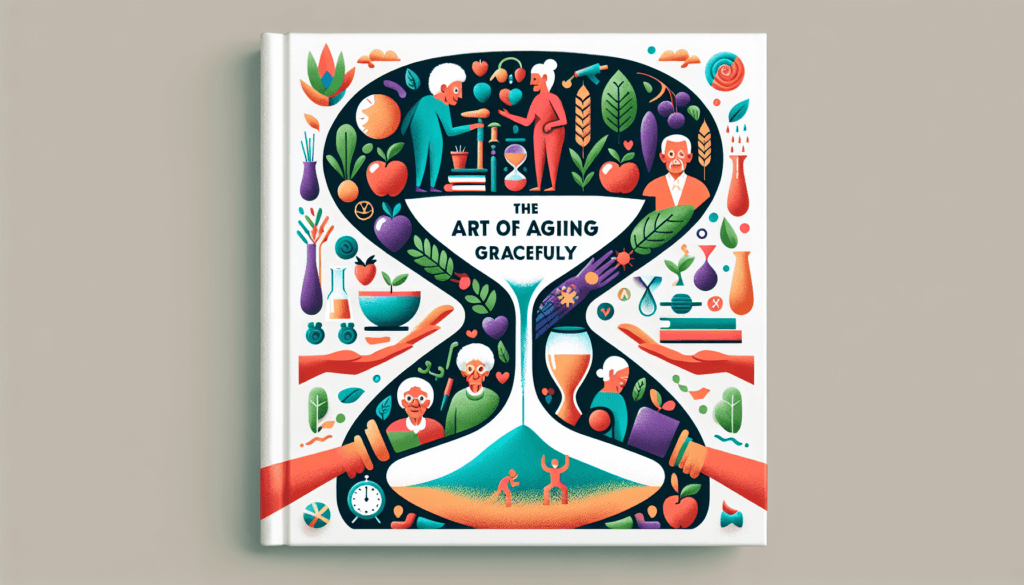As you grow older, it becomes increasingly important to prioritize your health and well-being. In this article, we will explore some essential tips and strategies on how to stay healthy and vibrant in later life. From maintaining a balanced diet to staying physically active, we will cover a range of practices that can contribute to your overall well-being, allowing you to embrace your later years with vitality and energy. So, let’s dive in and discover how you can make the most of your golden years by taking care of yourself!

Physical Health
Maintaining a Balanced Diet
One of the most important aspects of maintaining good physical health is to ensure a balanced diet. As you age, your nutritional needs may change, so it’s essential to make informed choices about the foods you consume. Include a variety of fruits, vegetables, whole grains, lean proteins, and healthy fats in your meals. Avoid excessive consumption of processed foods, sugary snacks, and beverages high in added sugars. Don’t forget to stay hydrated by drinking an adequate amount of water throughout the day.
Staying Active and Fit
Regular physical activity is crucial for overall health and well-being. Engaging in exercises and activities that strengthen your muscles, improve your cardiovascular health, and enhance your flexibility can help maintain a healthy weight, increase energy levels, and reduce the risk of chronic conditions. Aim for at least 150 minutes of moderate-intensity aerobic activity, such as brisk walking or swimming, per week. Additionally, don’t forget to incorporate strength training exercises two or more days a week.
Managing Chronic Conditions
If you have any chronic conditions, it’s important to adhere to the recommended treatment plans and medications prescribed by your healthcare provider. Ensure that you have a clear understanding of your condition, its management, and any lifestyle modifications you need to make. Keep all follow-up appointments and communicate any changes or concerns to your healthcare team. By actively managing your chronic conditions, you can minimize their impact on your daily life and maintain your overall health.
Getting Regular Health Check-ups
Regular health check-ups are essential for identifying and preventing potential health issues. Schedule routine visits with your healthcare provider to monitor your overall health and discuss any concerns you may have. These check-ups typically involve screenings for important metrics such as blood pressure, cholesterol levels, blood sugar levels, and cancer screenings. Early detection and intervention can significantly improve the outcomes of many health conditions.
Ensuring Adequate Sleep
Sleep plays a vital role in maintaining good physical health, cognitive function, and emotional well-being. Aim for seven to eight hours of quality sleep each night. Establish a regular sleep schedule and create a comfortable sleep environment that promotes relaxation. Avoid excessive caffeine intake, stimulating activities before bed, and electronic devices in the bedroom. If you find it difficult to sleep, practicing relaxation techniques, such as deep breathing or meditation, may help improve your sleep quality.
Mental and Emotional Well-being
Engaging in Cognitive Activities
Keeping your brain active and engaged can help maintain cognitive function and prevent age-related cognitive decline. Engage in activities that challenge your mind, such as puzzles, reading, learning new skills, or playing strategic games. Stimulating your brain regularly can enhance memory, critical thinking abilities, and overall mental acuity.
Managing Stress
Stress can have a significant impact on both your mental and physical health. It’s important to develop effective stress management techniques to cope with daily challenges. Engage in relaxation techniques, such as deep breathing exercises or meditation, to promote a sense of calm. Engaging in hobbies, pursuing creative outlets, and spending time in nature can also help reduce stress levels. If stress becomes overwhelming, consider seeking professional help or joining support groups.
Prioritizing Social Connections
Maintaining social connections is vital for emotional well-being and overall health. Make an effort to stay connected with friends, family, and your community. Attend social events, join clubs or organizations, or volunteer for activities that align with your interests. Engaging in social interactions can provide emotional support, decrease feelings of loneliness or isolation, and boost your mood.
Seeking Emotional Support
It’s important to recognize that seeking emotional support is a sign of strength, not weakness. If you’re facing challenges or going through difficult times, don’t hesitate to reach out to trusted friends, family members, or professionals. Speaking openly about your emotions and concerns can help alleviate stress and provide you with different perspectives or coping strategies.
Practicing Mindfulness
Practicing mindfulness involves grounding yourself in the present moment and being aware of your thoughts, feelings, and sensations without judgment. Engaging in mindfulness techniques, such as yoga, meditation, or deep breathing exercises, can reduce stress, improve focus, and enhance overall well-being. Make time each day to engage in mindfulness practices that work for you.

Maintaining a Healthy Weight
Understanding Caloric Needs
Maintaining a healthy weight is essential for overall health and preventing various diseases. Understanding your caloric needs based on age, gender, activity level, and overall health is crucial. Consult with a healthcare professional or registered dietitian to determine an appropriate daily caloric intake that aligns with your health goals.
Eating Nutritious Foods
Focus on consuming a variety of nutrient-dense foods that provide essential vitamins, minerals, and fiber. Include plenty of fruits, vegetables, whole grains, lean proteins, and healthy fats in your diet. Limit your intake of processed foods, sugary snacks, and beverages, as they can contribute to weight gain and increased risk of chronic diseases. Remember that a balanced and nourishing diet is key to maintaining a healthy weight.
Monitoring Portion Sizes
Portion control plays a significant role in managing weight. Be mindful of the portion sizes when preparing or ordering meals. Aim to fill half of your plate with vegetables and divide the remaining space for lean proteins and whole grains. Consider using smaller plates or bowls to help control portion sizes. Avoid eating until you feel overly full, and listen to your body’s hunger and fullness cues.
Finding Enjoyable Physical Activities
Engaging in physical activities that you enjoy is crucial for sustaining a healthy weight. Find exercises or activities that you genuinely like and incorporate them into your routine. It could be dancing, swimming, hiking, or even gardening. Regular physical activity not only helps with weight management but also enhances overall fitness, mood, and wellbeing.
Avoiding Crash Diets
When trying to achieve or maintain a healthy weight, it’s important to avoid crash diets or extreme weight loss programs. These approaches often lead to short-term results and can be detrimental to your overall health. Instead, focus on making sustainable lifestyle changes that include balanced eating, regular physical activity, and healthy habits.
Preventing Age-related Diseases
Adopting a Heart-Healthy Lifestyle
Maintaining a heart-healthy lifestyle is crucial for preventing cardiovascular diseases. Incorporate heart-friendly foods such as fish high in omega-3 fatty acids, fruits, vegetables, whole grains, and lean proteins into your diet. Limit foods high in saturated and trans fats, sodium, and added sugars. Engage in regular physical activity, manage stress, avoid smoking, and limit alcohol consumption to support heart health.
Reducing the Risk of Cancer
While it’s impossible to eliminate all cancer risks, you can take steps to reduce the chances of developing certain types of cancer. Quit smoking if you’re a smoker and avoid exposure to secondhand smoke. Protect your skin from harmful UV radiation by wearing sunscreen and protective clothing when outdoors. Engage in regular physical activity and consume a diet rich in fruits, vegetables, whole grains, and lean proteins.
Managing Diabetes
Diabetes is a chronic condition that requires careful management to prevent complications. Follow a balanced diet that focuses on portion control, limiting added sugars, and including foods with a low glycemic index. Engage in regular physical activity to support healthy blood sugar levels. If you have diabetes, work closely with your healthcare provider to monitor your blood sugar, adhere to medication or insulin regimens, and undergo routine screenings.
Protecting Bone Health
Maintaining strong bones is important to prevent conditions such as osteoporosis. Ensure an adequate intake of calcium and vitamin D through foods like dairy products, leafy greens, and fortified products or supplements. Engage in weight-bearing exercises, such as walking or weightlifting, to maintain bone density. Seek your healthcare provider’s guidance regarding bone health screenings and appropriate supplements if needed.
Lowering the Risk of Alzheimer’s Disease
While there is no definitive way to prevent Alzheimer’s disease, there are lifestyle choices that can help reduce the risk. Engage in regular physical exercise, maintain a healthy diet, stay mentally active, and manage chronic conditions such as high blood pressure, diabetes, and high cholesterol. Stay socially connected and seek regular mental health check-ups to promote cognitive well-being.

Creating a Supportive Environment
Designing an Age-friendly Home
A supportive living environment can enhance safety, mobility, and overall well-being. Assess your home for potential hazards and make necessary modifications to promote accessibility. Install grab bars in bathrooms, ensure proper lighting, remove tripping hazards, and consider assistive devices if needed. Create a comfortable and functional living space that supports your specific needs as you age.
Ensuring Safety and Accessibility
Prioritizing safety is essential to prevent accidents and injuries. Install smoke detectors, carbon monoxide detectors, and fire extinguishers in your home. Ensure walkways are clear and well-lit, and consider handrails for staircases. Make sure your home is easily accessible for you and any visitors, considering factors such as ramps or elevator access, widened doorways, and slip-resistant surfaces.
Seeking Community Resources
Exploring community resources can provide valuable support and assistance as you age. Research local organizations, senior centers, or community outreach programs that offer services such as meal delivery, transportation assistance, social activities, or educational programs. These resources help you stay engaged, connected, and receive the support you may need.
Maintaining Active Social Life
Social connections are an integral part of a healthy and vibrant life. Stay socially active by participating in community events, joining clubs or groups with similar interests, and nurturing relationships with family and friends. Engaging in social activities can boost your mental well-being, provide a support system, and combat feelings of loneliness.
Joining Support Groups
Joining support groups specific to your interests or health conditions can provide a sense of belonging, understanding, and support. Interacting with individuals who share similar experiences can offer valuable insights, advice, and emotional support. Consider seeking out local or online support groups that align with your needs or interests.
Building Resilience
Maintaining a Positive Mindset
A positive mindset can greatly influence your overall well-being. Cultivate a positive outlook by focusing on gratitude, practicing self-compassion, and challenging negative thoughts. Surround yourself with positive influences, and engage in activities that bring you joy and fulfillment. By maintaining a positive mindset, you can better navigate life’s challenges and maintain resilience.
Developing Coping Strategies
Developing effective coping strategies is crucial for managing stress and adversity. Identify healthy coping mechanisms that work for you, such as engaging in physical activity, practicing relaxation techniques, seeking emotional support, or engaging in creative outlets. By developing a range of coping strategies, you can better navigate and adapt to various situations.
Embracing Change
Change is a natural part of life, and embracing it can lead to personal growth and resilience. Approach change with a flexible and open mindset, viewing it as an opportunity for learning and adaptation. Recognize that change can bring both challenges and opportunities, and focus on finding constructive ways to navigate through transitions.
Setting Realistic Goals
Setting realistic goals can provide a sense of purpose and accomplishment. Break down larger goals into smaller, manageable steps to ensure progress and prevent overwhelm. Celebrate each milestone along the way, and don’t be afraid to adjust your goals if circumstances change. By setting realistic goals, you can maintain motivation, focus, and resilience in achieving them.
Practicing Gratitude
Expressing gratitude for the positive aspects of your life can enhance overall well-being and resilience. Take time each day to reflect on things you’re grateful for and acknowledge the small joys and blessings. Consider keeping a gratitude journal or expressing gratitude to others, as this can help shift your mindset and promote a positive outlook.

Staying Engaged and Productive
Continuing Education
Engaging in lifelong learning can keep your mind active and enhance personal growth. Consider enrolling in classes or workshops that cover topics you’re interested in or have always wanted to explore. Pursue educational opportunities at local colleges, community centers, or online platforms. By continuing to learn and expand your knowledge, you can stay engaged and mentally sharp.
Pursuing Hobbies and Interests
Dedicating time to pursue hobbies and interests enriches your life and provides a sense of fulfillment. Rediscover old hobbies or explore new ones that bring you joy and ignite your passion. Whether it’s painting, gardening, playing a musical instrument, or cooking, engaging in activities that spark your interest can enhance your overall well-being.
Volunteering
Volunteering your time and skills can give back to your community and provide a sense of purpose. Find volunteer opportunities that align with your interests or skills. It could involve assisting at local organizations, supporting a cause you’re passionate about, or mentoring younger individuals. Volunteering not only benefits others but also promotes a sense of fulfillment and satisfaction in your own life.
Exploring New Skills
Don’t be afraid to step outside your comfort zone and learn new skills. It could be learning a new language, trying a new sport, or developing a new craft. Embracing new challenges fosters personal growth, expands your capabilities, and keeps your mind engaged. Explore various hobbies or take classes that expose you to different skills and experiences.
Sharing Knowledge and Experience
As you age, your life experiences and wisdom become valuable assets. Share your knowledge and experience with others through mentoring, tutoring, or volunteering in educational programs. Teach others what you’ve learned throughout your life, and contribute to the growth and development of younger generations. Sharing your expertise can provide a sense of purpose and positively impact the lives of those around you.
Ensuring Good Hygiene
Practicing Regular Personal Care
Maintaining regular personal care habits is crucial for hygiene and overall well-being. Stay on top of personal hygiene routines such as bathing or showering regularly, brushing your teeth twice a day, and practicing good oral hygiene. Attend regular preventive health check-ups with your healthcare provider, including dental and vision exams.
Maintaining Dental and Oral Health
Proper dental and oral hygiene is important for maintaining overall health. Brush your teeth at least twice a day, floss daily, and visit your dentist regularly for cleanings and check-ups. Avoid tobacco use and limit your consumption of sugary foods and beverages to help prevent dental issues such as cavities and gum disease.
Promoting Skin Care
Taking care of your skin helps maintain its health and appearance. Protect your skin from harmful UV rays by wearing sunscreen, even on cloudy days. Moisturize daily, particularly after bathing, to keep your skin hydrated. Avoid excessive sun exposure and consider wearing protective clothing and accessories, such as hats and sunglasses.
Preventing Infections
Practicing good hygiene habits can significantly reduce the risk of infections. Wash your hands thoroughly with soap and water for at least 20 seconds, especially before preparing meals or eating, after using the restroom, and after coughing or sneezing. Avoid close contact with individuals who are sick, and cover your mouth and nose with a tissue or your elbow when coughing or sneezing.
Maintaining a Clean Living Environment
A clean and well-maintained living environment is essential for good hygiene. Regularly clean and disinfect commonly touched surfaces, such as doorknobs, light switches, and countertops. Keep your living space free of clutter to prevent the accumulation of dust and allergens. Ensure proper ventilation and air circulation to maintain a fresh and clean atmosphere.

Prioritizing Eye and Ear Health
Scheduling Regular Eye Exams
Regular eye exams are crucial for maintaining good eye health, detecting potential issues early, and obtaining appropriate corrective lenses. Schedule regular appointments with an optometrist or ophthalmologist to monitor your eye health, update prescription glasses or contact lenses, and address any concerns or changes in vision.
Protecting Eyes from Sun and Screens
Exposure to ultraviolet (UV) rays can harm your eyes, so protect them by wearing sunglasses that block 100% of UV rays when you’re outdoors. Reduce eye strain caused by electronic devices by following the 20-20-20 rule: every 20 minutes, take a 20-second break and focus on something at least 20 feet away. Consider using a screen filter or adjusting display settings to minimize eye strain.
Maintaining Ear Hygiene
Maintaining proper ear hygiene is important for ear health. Clean your ears regularly by gently washing the outer part with a washcloth. Avoid using cotton swabs or inserting foreign objects into your ear canal, as they can cause damage or push wax deeper into the ear. If you experience any hearing problems or discomfort, seek evaluation from an audiologist or an ear, nose, and throat specialist.
Using Proper Hearing Protection
Protecting your ears from loud noises is crucial for preventing hearing loss and damage. Use earplugs or earmuffs when exposed to loud environments, such as concerts, construction sites, or sporting events. Limit the use of headphones or earbuds and keep the volume at a safe level. If you experience any changes in your hearing or ringing in your ears, consult a healthcare professional.
Seeking Treatment for Vision and Hearing Conditions
If you notice any changes in your vision or hearing, seek prompt medical attention. Addressing potential issues early on can prevent further deterioration and improve overall quality of life. Whether it’s blurry vision, difficulty seeing at night, trouble understanding speech, or hearing loss, consult with healthcare professionals specialized in ophthalmology or audiology for thorough evaluation and appropriate treatment options.
Monitoring Medications and Vaccinations
Keeping Track of Medications
It’s important to stay organized and keep track of your medications. Create a system to manage your medications, whether it’s using pill organizers, smartphone apps, or written schedules. Make sure you understand the purpose, dosage instructions, and potential side effects of each medication. If you have any concerns or difficulty managing your medications, consult your healthcare provider or pharmacist.
Adhering to Prescribed Dosages
Taking medications as prescribed by your healthcare provider is crucial for maintaining good health. Follow the prescribed dosage instructions and frequency of each medication. Avoid skipping doses or doubling up on medications unless instructed by your healthcare provider. If you encounter any difficulties with medication adherence, discuss them openly with your healthcare team for support and guidance.
Being Aware of Potential Side Effects
Understanding the potential side effects of your medications is essential for proactive management of your health. Read the information leaflets provided with your medication or consult your healthcare provider or pharmacist for detailed information. Be vigilant for any unexpected changes or adverse reactions and communicate them to your healthcare provider promptly.
Staying Up-to-date with Vaccinations
Vaccinations protect against various diseases and play a significant role in preventing illness. Stay up-to-date with recommended vaccinations, including annual influenza vaccines and other vaccines as recommended by your healthcare provider. Vaccines such as those for pneumonia, shingles, and tetanus should be administered according to recommended schedules or booster requirements.
Consulting Healthcare Professionals
Maintaining open and regular communication with your healthcare professionals is important for monitoring your health and ensuring appropriate medical care. Schedule routine check-ups, even if you’re feeling well, to discuss any concerns or changes in your health. Be proactive in sharing information regarding medication use, lifestyle habits, and any symptoms you may be experiencing. Collaborating with your healthcare team helps promote overall wellness and helps them provide tailored care to meet your specific needs.
By implementing these strategies and maintaining a holistic approach to your well-being, you can stay healthy, vibrant, and enjoy a fulfilling later life. Remember, small changes and consistent efforts can make a significant impact on your overall health and quality of life. Embrace a positive and proactive mindset, and prioritize self-care in all aspects of your life. Stay connected, seek professional guidance when needed, and enjoy the journey of healthy aging.


